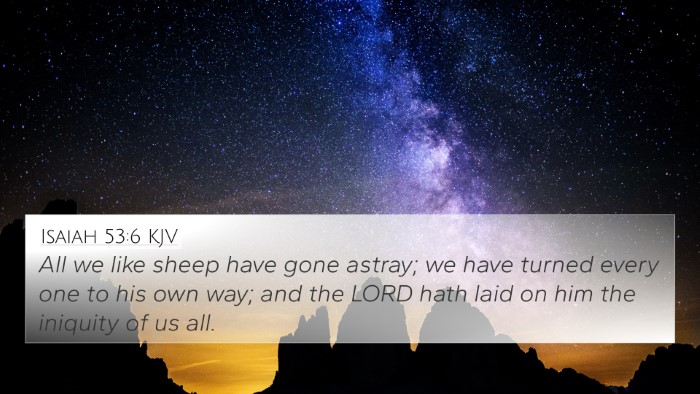Understanding Matthew 15:24
Bible Verse: "But he answered and said, I am not sent but unto the lost sheep of the house of Israel." - Matthew 15:24
In this verse, Jesus clarifies His mission on Earth, indicating a focused ministry directed toward His own people, the Israelites. This is a profound statement that encapsulates both His divine purpose and the context of His earthly ministry.
Contextual Insights
This declaration comes after a Canaanite woman approaches Jesus, seeking healing for her demon-possessed daughter. Initially, Jesus's interaction may seem harsh, yet it serves to illustrate His mission's priority to Israel before reaching out to the Gentiles. Matthew Henry notes that this is indicative of the order of salvation as it was to the Jews first, and then the Gentiles.
Thematic Analysis
Matthew 15:24 highlights several key themes:
- Divine Mission: Jesus was sent primarily to save the Jews, embodying the Jewish messianic expectations.
- Inclusivity of the Gospel: While this verse focuses on Israel, it sets a foundation for the later Great Commission where Jesus instructs his followers to go to all nations (Matthew 28:19-20).
- Faith and Persistence: The woman's faith challenges the understanding of Jesus’s mission, indicating that while focused on Israel, His compassion extends beyond boundaries.
Connections to Other Scriptures
This verse finds rich intertextual connections throughout the Bible:
- Matthew 10:5-6: Similarity in being sent to the lost sheep of Israel.
- John 1:11: "He came to his own, and his own received him not."
- Romans 1:16: The Gospel is “to the Jew first, and also to the Greek.”
- Isaiah 53:6: “All we like sheep have gone astray; we have turned everyone to his own way.”
- Acts 3:26: God sent Jesus first to bless Israel by turning each of them from their wickedness.
- Luke 19:10: "For the Son of Man came to seek and to save the lost."
- John 10:14: "I am the good shepherd; and know my sheep, and am known of mine."
- Ephesians 2:12-13: Discusses the separation of Jews and Gentiles and the purpose of bringing them together through Christ.
Detailed Commentary Insights
Matthew Henry: Henry emphasizes the importance of recognizing Jesus's focus on Israel while foreshadowing the call to the Gentiles. The phrase "lost sheep" signifies those in need of guidance and salvation.
Adam Clarke: Clarke points out that while Jesus's mission is primarily to the Jews, this does not negate the compassion that leads to eventual healing of the Canaanite woman's daughter, demonstrating that God’s mercy surpasses national boundaries.
Albert Barnes: Barnes interprets this verse to illustrate a principle of priorities in ministry, suggesting that Jesus’s focus was on fulfilling the Old Testament prophecies regarding Israel before addressing the broader Gentile mission.
Conclusion
Matthew 15:24 serves as a pivotal text for understanding Jesus's earthly mission, illustrating the search for lost souls within the context of His Jewish ministry. This doorway opens the way to a more inclusive understanding of His mission as it unfolds through the New Testament, transforming the implications of this singular mission into a universal call for all humanity.
Cross-Referencing Bible Study
For those seeking to study this verse further, consider the tools for Bible cross-referencing:
- Utilize a Bible concordance for keyword searches.
- Engage with a cross-reference Bible study to explore similar themes.
- Employ a Bible reference resource to track thematic connections.













